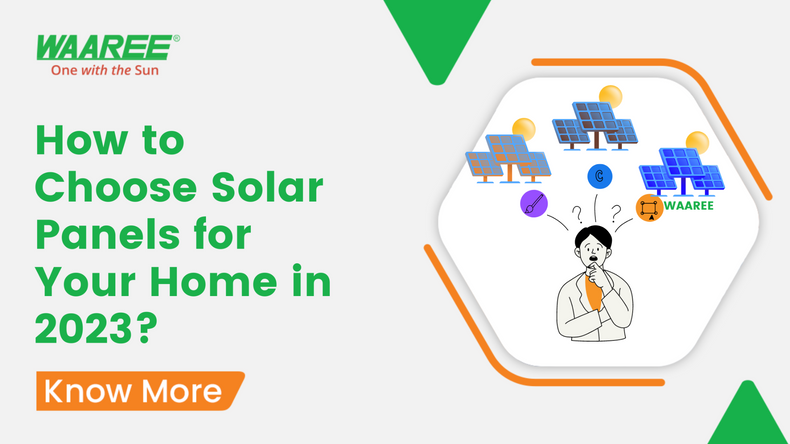Factors to Consider When Choosing Solar Panels for your Home
As we move further into the future, renewable energy sources are becoming increasingly popular and necessary for a more sustainable future. Solar panels have become one of the most popular ways for homeowners to take advantage of this trend and reduce their carbon footprint. With the growing demand for solar panels, the market is overflowing with options and it can be overwhelming to know where to start. In this blog, we'll discuss the key factors to consider when choosing solar panels for your home in 2023.
Energy Needs
Before selecting a solar panel system, it's important to understand your energy needs. The amount of energy you use depends on a number of factors such as the size of your home, your energy-efficient appliances and how much power you use. A professional energy audit can help you determine your energy needs and help you make the right choice for your home.
Panel Efficiency
One of the most important factors to consider when choosing solar panels is their efficiency. A solar panel's efficiency refers to its ability to convert sunlight into electricity. The higher the efficiency of a panel, the more electricity it can produce. Currently, the most efficient solar panels have an efficiency rate of around 22%. When choosing solar panels, make sure to look for panels with a high efficiency rating, as this will help you get the most out of your investment.
Read Further: Solar Panel Efficiency: How important is it?
Panel Wattage
Wattage is another important factor to consider when choosing solar panels. Wattage refers to the amount of power a panel can produce. When choosing a solar panel system, look for panels with a high wattage rating. Keep in mind that a higher wattage rating means the panel will be more expensive, but it will also generate more electricity, making it a more efficient investment in the long run.
Panel Size
The size of the solar panel is also important to consider when choosing a solar panel system. Larger panels will generate more electricity, but they will also be more expensive and take up more space on your roof. Consider the size of your roof and the amount of electricity you need when choosing solar panels for your home.
Cost
Cost is always a factor when making any purchase, and choosing solar panels for your home is no different. When considering the cost of solar panels, it's important to keep in mind that you're making an investment in the future. Solar panels have a long lifespan and will generate electricity for many years to come, making them a smart investment in the long run.
Brand Reputation
Finally, when choosing solar panels for your home, it's important to consider the brand reputation. Choose a brand with a solid reputation and a history of producing quality products. Look for brands that offer warranties and have good customer service, as this will help ensure that you have a positive experience with your solar panel system.
How long is the installation process?
- As a homeowner, the thought of installing solar panels on your roof can be both exciting and overwhelming. On one hand, you will be making a significant investment in clean energy and reducing your monthly energy bills. On the other hand, you may be wondering how long the entire process will take from start to finish. This can range from a few weeks to several months, depending on several factors.
Here is a step-by-step guide on the solar installation process and how long it takes.
Site Assessment
The first step in the solar installation process is a site assessment. A solar professional will come to your home to evaluate your roof, assess the shading patterns and determine if your home is a good fit for solar panels. This typically takes one to two hours and is done at no cost to you.
Timeframe: 1-2 hours
Design and Planning
Once the site assessment is complete, the solar professional will design a solar panel system that fits your home's energy needs. This includes determining the number of panels needed, the orientation and tilt of the panels, and the location of the inverter. The design process usually takes several days to a week.
Timeframe: 1-2 weeks
Obtaining Permits
In most states, you will need to obtain permits to install solar panels. This is usually done by the solar professional, but it can also be done by the homeowner. The time it takes to obtain permits varies depending on the state and the municipality where you live. It can take anywhere from a few days to several months.
Timeframe: 1-3 months
Installation
The installation of the solar panels is typically the shortest step in the process. It can take anywhere from one to three days, depending on the size of the system and the complexity of the roof. This is usually the most disruptive part of the process, as the roof will be temporarily inaccessible, but the solar professional will work with you to minimize the impact.
Timeframe: 1-3 days
Inspection and Interconnection
Once the installation is complete, the solar panels will need to be inspected by the local building department and utility company. This is done to ensure that the system meets all building codes and safety standards. After the inspection, the system will be interconnected to the grid, which means that it will start producing energy. This step can take several weeks to a month.
Timeframe: 1-4 weeks
Read more information: Step by Step Guide for Solar Panel Installation in 2023
Pros and cons of residential solar
|
Pros of Residential Solar |
|
Lower Energy Bills |
|
Increase Home Value |
|
Reduce Dependence on Fossil Fuels |
|
Eco-Friendly Option |
|
Incentives and Tax Credits Available |
|
No Noise or Emissions |
|
27-Year Warranty |
|
Energy Independence |
|
Cons of Residential Solar |
|
High Initial Cost |
|
Limited to Sunlight Availability |
|
May Need to Upgrade Electrical Panel |
|
May Need to Replace Roof |
|
May Require HOA Approval |
|
May Not Be Ideal for Small or Shaded Properties |
|
Long Payback Period |
|
May Not Be Available in Certain Areas |
|
May Require Maintenance |
Is solar right for you?
Whether solar energy is right for you depends on several factors, including:
- Location: Solar panels work best in sunny locations with strong sun exposure.
- Energy consumption: Solar panels are more cost-effective if you have high energy consumption.
- Roof space: You need enough roof space to install the solar panels.
- Cost: Solar panels can be expensive to install, but they can save you money in the long run if your energy consumption is high.
- Future plans: If you plan to move in the near future, it may not be worth investing in solar panels.
- Energy independence: Solar panels provide energy independence, allowing you to generate your own electricity.
- Environment: Solar energy is a renewable energy source that does not produce greenhouse gases, making it a cleaner and greener option.
It is always recommended to consult with a solar professional to assess your specific situation and determine whether solar energy is right for you.
Connect with experts at Waaree to know more about the right product fit for your solar energy requirements at waaree@waaree.com or 18002121321.



